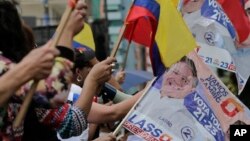Vote counting in Ecuador's presidential election dragged into a third day Tuesday with ruling party candidate Lenin Moreno still just short of a definitive first-round victory and supporters and opponents of outgoing President Rafael Correa trading heated accusations.
With the last ballots trickling in from Sunday's election, Moreno had a little over 39 percent of the votes and an almost 11-point lead over conservative Guillermo Lasso, a former banker who finished second in a field of nine candidates. But Moreno remained just under a point below the 40 percent threshold needed to avoid an April runoff.
It was the first time in recent memory that Ecuadorean authorities had not declared a winner on election night, leading Lasso and many of his supporters to charge that an attempt at fraud was underway as Correa's leftist movement sought to hold onto power at a time the rest of South America has shifted to the right. But Lasso's side did not present any evidence of irregularities.
Late Monday, hundreds of Lasso supporters hunkered down in a heavy rain outside the National Electoral Council for a second night to demand that a runoff be confirmed. Earlier in the day, a few thousand people were in the crowd.
“Ecuadorean people: You have won. We're going to defend this victory,” Lasso told supporters in a video message in which he urged protesters to stay mobilized. He said he had called several regional presidents and the head of the Organization of American States to express his concern.
“It's very strange that here in the 21st century the results aren't known the same day as the election,” Lasso later told the NTN24 network, saying that he did not trust Ecuadorean electoral authorities.
Moreno, who served as Correa's vice president from 2006 to 2013, was emphatic that he won outright.
With more than 92 percent of polling stations reporting late Monday, his lead had shrunk slightly from earlier in the day but he was still ahead with 39 percent of the vote to 28 percent for Lasso.
“It's striking to me that there is a loser politician out there calling for violence,” Moreno said at a news conference Monday night. “This can't be tolerated. We're a nation of peace and we want to continue that way.” He said he would respect the final count, whatever the outcome.
Rumors swirled on social media about the vote count. A group of people broke down a door at a building in Quito where ballots were supposedly being burned. Outside an electoral office in Guayaquil, police erected barricades to keep supporters and opponents of Correa apart. The Defense Ministry issued a statement denying reports that some sort of military uprising was underway.
Electoral authorities appealed for calm, saying it could take until Wednesday to know if a runoff would be necessary. They said the delay was due to slow arrival of ballots cast in remote rural regions and consulates abroad as well as inconsistencies on tally sheets that needed to be sorted through.
Observers from the Washington-based Organization of American States told electoral authorities that it was important to count the ballots as quickly and as transparently as possible, and urged them to continue informing the public of their progress to shore up credibility in the process.
The outcome of the race is being watched closely in Latin America, where conservative leaders in Argentina, Brazil and Peru have assumed power in the past 18 months after the end of a commodities boom that boosted leftists like Correa.
A self-declared “21st century socialist,” Correa was elected president in 2007 and he won praise for ushering in stability for Ecuador after a severe economic crisis that saw three presidents toppled by street protests and the adoption of the U.S. dollar to control rampant inflation.
But Correa also drew criticism for his iron-fisted approach against much of the press, opposition and judiciary.
The sheen on his administration also has been tarnished as once-flush government budgets were cut and thousands of employees at state-run companies laid off amid a decline in oil revenues for the OPEC nation. The International Monetary Fund has forecast Ecuador's economy to shrink 2.7 percent this year and many analysts predict that Correa's successor will have to seek a bailout from the multilateral lender.




